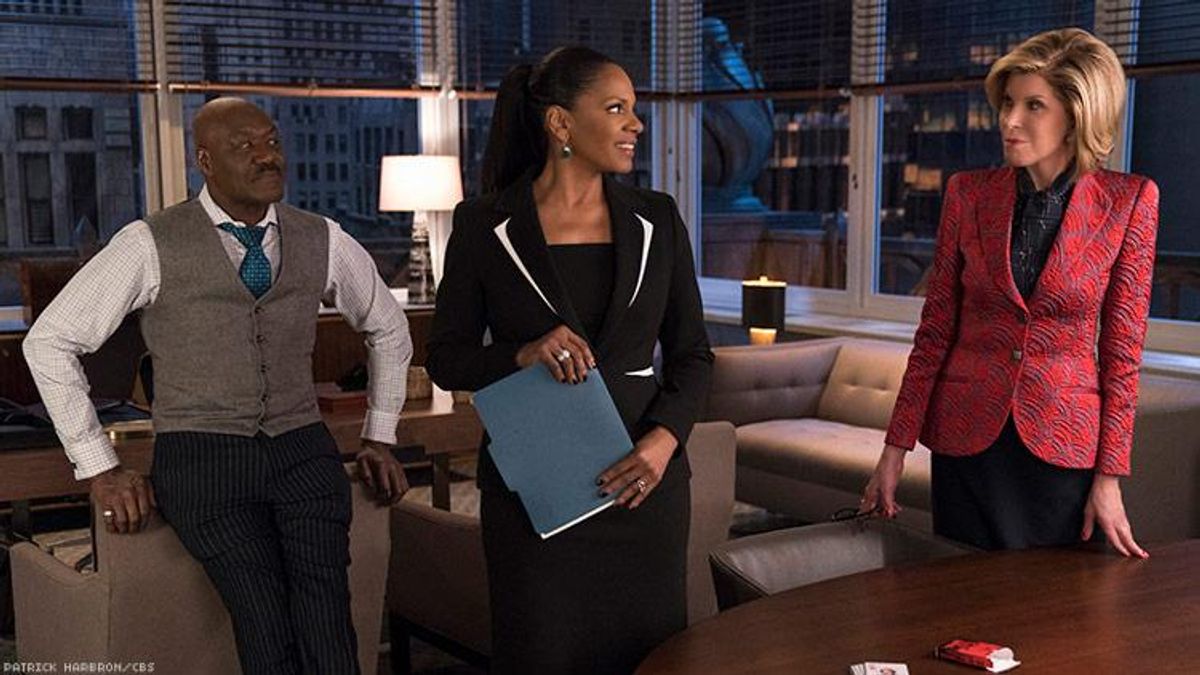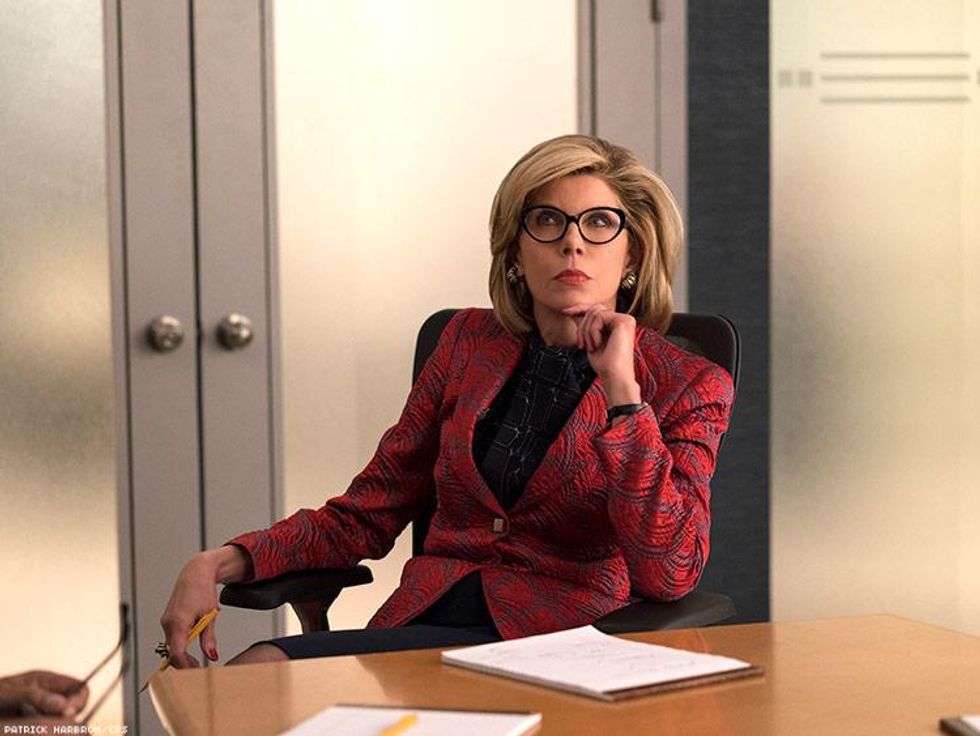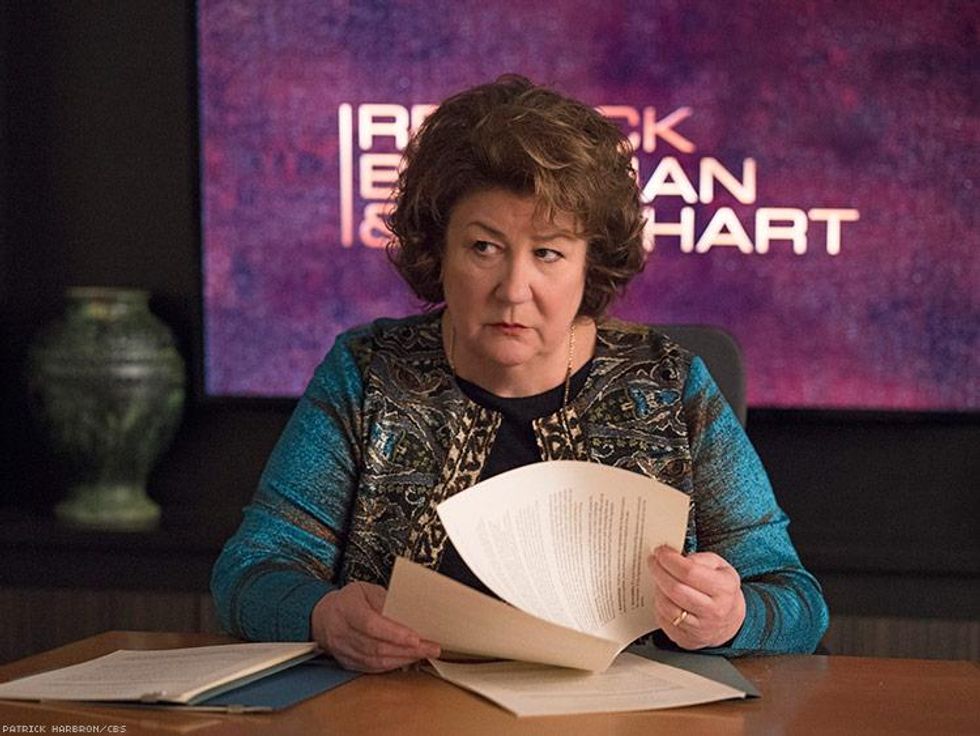The highly choreographed opening of The Good Fight's upcoming episode, airing Sunday, telegraphs that something out of the ordinary is about to occur -- not just in the episode but also on television at large. The windows of the conference room at the show's law firm of Reddick, Boseman & Lockhart have been blacked out with an opaque adhesive, the partners' schedules have been cleared, and about a dozen nondisclosure agreements have been fastidiously placed on a conference table, adding a whiff of the momentous to the mise-en-scene.
What unfolds over the hour is that Robert and Michelle King, the married creators of The Good Fight who boldly conceived the universe of The Good Wife, actually go there and imagine how the process of impeaching Donald Trump could begin. The plot revolves around the series' attorneys auditioning, as it were, to land the impeachment case in an episode that ponders whether it's morally permissible to tweak the truth for a greater good when dealing with a megalomaniac who is seemingly above the law.
"Impeachment isn't about the law. It's about persuading people," Christine Baranski's Diane Lockhart -- one of the series' leads and a towering figure from The Good Wife who's resorted to coping with life under Trump by micro-dosing psilocybin and stashing a gun in her desk -- informs the firm after one of her partners proposes an unorthodox strategy to impeach him. "An impeachment has to be shameless or else it's going to fail!" Diane adds.
"Nothing escapes the Kings and this law firm, and the world that The Good Fight is taking place in is in real time. It's who we are in the world today," Audra McDonald, who plays one of the firm's partners, Liz Reddick, tells The Advocate about the Kings' fearlessness in tackling hot-button topics. "They are exploring everything. The minute you think, Oh, well, I see it going in this direction, something will happen in the real world and so we'll take a left turn in the way that the real world is a plot twist -- left, right, and center."

Christine Baranski
To set the episode's plot in motion, the show enlists the help of Margo Martindale, who reprises her role as a Ruth Eastman, a fierce consultant for the Democratic National Committee whom Good Wife fans will recall unseated Alan Cumming's Eli Gold as the Illinois governor's campaign adviser for the better part of a season. Safely inside the walls of the firm's now blacked-out conference room, Eastman instructs the partners to stash their electronics and to take notes on only the pads provided. The notes will later be destroyed, she tells them before dropping the official bombshell.
"We're in a very peculiar time," Martindale's Ruth says, causing Diane to laugh inappropriately as she often has out of sheer incredulity this season at the madness of Trump's presidency.
"We should laugh. It's the only sane reaction. We're living a time of farce, not tragedy. And the Democratic Party, for the first time, has a plan to respond," Ruth continues. "You can laugh at that too," she adds with a wink and a nudge to the criticism of the Democratic Party's inaction in the face of Trump.
The episode that unwinds is part fantasy, part wish-fulfillment for the characters who bat around the familiar arguments they might pitch to the DNC to take down the guy who sits in the Oval Office. The words "collusion" and "obstruction" come up often in the episode, leaving them increasingly, purposefully devoid of meaning through repetition. As Diane and her partners, including McDonald's Liz and Delroy Lindo's Adrian Boseman, drill down into which argument is the golden ticket to fell Trump, the show invites the audience to fantasize about impeachment with them. But it's not just the characters and the audience who've been given the space to dream about what removing Trump from office might look like. The cast has been enthralled by the implications of the episode as well.
"That was something that I find fascinating," says Rose Leslie, a native of Ireland who plays Diane's goddaughter and protege at the firm, Maia Rindell. "For me, personally, I am a guest in your extraordinary country, and as a result I don't necessarily want to be a political commentator, but I just find it so just eye-opening. I find myself fantasizing about this potential scenario taking place, and I thought that was a fantastic thing to read and kind of galloped through that episode because I thought, Oh, my God, how timely is that?"

Margo Martindale
In the vein of its parent series, The Good Fight, currently midway through its second season, doesn't shy away from taking on difficult subjects. The drama, arguably one of the most diverse shows on television, is pre-programmed to take on the issues of the day with its setting in a primarily black law firm, a female lead character who's over 60, and a lesbian character (Maia). And despite the show's penchant for excavating politics, the law, racism, misogyny, and more, the Trump impeachment episode goes particularly deep. It not only allows the characters and audience to imagine the country without him but offers Diane, a Hillary Clinton contemporary and supporter as far back as the dawn of The Good Wife in 2009, to let loose with a litany of outrage that will resonate for non-Trump supporters.
"It's like a study in what happens to someone who's always been sane and always the grown-up in the room and always the one who believes in a certain liberal value system, belief in the law, belief in the rule of law, and watches as the world turns off its axis," Baranksi says of Diane's existential break under what she calls the "Trumpoverse," a crisis that bubbles over into a certain clarity midway through the impeachment episode.
"You know, there's an overarching theme to the second season, and it does have to do with that sense of having to live under the cloud of the presidency," Baranski says.
At a point in the episode, the firm's partners realize they're spinning their wheels with hackneyed arguments to win the bid until McDonald's Liz suggests they play by Trump's rules and go above the law -- a bold proposal that catches the eye of the DNC.
As with any given episode of The Good Fight, the multifaceted narrative digs into several issues at once, in this case examining racially based micro-aggressions when members of the DNC are drawn to the firm only when Liz and Lindo's Adrian play at being angry while Diane plays peacemaker. But the soul of the episode involves the characters negotiating, both individually and as a group, over how far they can bend the law for an outcome that benefits the most people.
The second season could have focused on how "Trump makes people feel," says Cush Jumbo, a Good Wife alumna who plays attorney Lucca Quinn. "But it's really about how people are dealing with it on a day-to-day-basis in terms of the law firm. How does politics affect people's belief in the justice system and how do we as lawyers believe in what we're doing when we are being sucked into moral mazes of decision-making, which is in the air because of the way politics is going?"
Of course, as is also they way of the world of The Good Fight, the episode provides no easy answers in terms of what the moral choice is, but as the firm's partners battle for the bid, it's oh, so easy to imagine a world in which they win the bid and the impeachment case.
The Good Fight airs Sundays on CBS All Access.





















































































Viral post saying Republicans 'have two daddies now' has MAGA hot and bothered